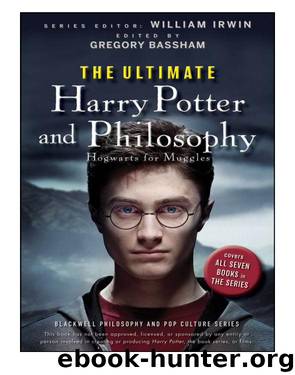The Ultimate Harry Potter and Philosophy by William Irwin & Bassham Gregory

Author:William Irwin & Bassham, Gregory
Language: eng
Format: epub
Publisher: Wiley
Published: 2010-08-06T04:00:00+00:00
NOTES
1 Both Plato and Alcibiades were students of the great Athenian philosopher Socrates.
2 Plato, “Seventh Letter,” 324b-324c.
3 Ibid., 324d.
4 Ibid., 325a.
5 This term is often rendered “philosopher-king,” but we find this misleading because Plato—ahead of his time here, as often elsewhere—believed that women were perfectly capable of fulfilling the duties of this highest political office.
6 Plato, The Republic, 494b-494d.
7 Ibid., 521a.
8 Ibid., 520d.
9 Ibid., 360b-360c. One finds the same theme in the relatively recent film Hollow Man, where a decent research scientist played by Kevin Bacon becomes invisible and goes on a rampage worthy of Gyges himself.
10 Plato himself is deeply suspicious of the unnecessary multiplication of rules and regulations, which only serves to cheapen their value. See Republic, 425e-426e.
11 Order of the Phoenix, p. 266.
12 Half-Blood Prince, p. 276.
13 Ibid., p. 361.
14 Ibid., p. 361.
15 Interestingly, plenty of defenders of a more enlightened egoism would suggest that Voldemort’s egocentrism was self-defeating because it contained the seeds of his destruction. Had he truly loved himself more, he would have realized that the best way to promote his own interests was not to be so transparently egoistic.
16 Deathly Hallows, p. 717.
17 Ibid., pp. 717-718.
18 For more on this theme, see Gregory Bassham’s chapter on Dumbledore in this volume, “Choices vs. Abilities: Dumbledore on Self-Understanding.”
19 This parallel is noted in David Baggett and Shawn E. Klein’s “The Magic of Philosophy,” in Harry Potter and Philosophy: If Aristotle Ran Hogwarts (Chicago: Open Court, 2004), p. 3. Notably, another philosopher, Jean-Jacques Rousseau (1712-1778), asked himself the same question that faces Gyges and Harry: “I have often asked myself what use I would have made of this ring?” His answer turns out to parallel Harry’s actions—namely, that he would use his power to promote the public good. Jean-Jacques Rousseau, Reveries of the Solitary Walker, translated by Charles Butterworth (Indianapolis: Hackett, 1992), p. 82.
Download
This site does not store any files on its server. We only index and link to content provided by other sites. Please contact the content providers to delete copyright contents if any and email us, we'll remove relevant links or contents immediately.
4 3 2 1: A Novel by Paul Auster(12352)
The handmaid's tale by Margaret Atwood(7725)
Giovanni's Room by James Baldwin(7293)
Asking the Right Questions: A Guide to Critical Thinking by M. Neil Browne & Stuart M. Keeley(5734)
Big Magic: Creative Living Beyond Fear by Elizabeth Gilbert(5721)
Ego Is the Enemy by Ryan Holiday(5383)
The Body: A Guide for Occupants by Bill Bryson(5060)
On Writing A Memoir of the Craft by Stephen King(4908)
Ken Follett - World without end by Ken Follett(4701)
Adulting by Kelly Williams Brown(4549)
Bluets by Maggie Nelson(4533)
Eat That Frog! by Brian Tracy(4497)
Guilty Pleasures by Laurell K Hamilton(4416)
The Poetry of Pablo Neruda by Pablo Neruda(4077)
Alive: The Story of the Andes Survivors by Piers Paul Read(4009)
White Noise - A Novel by Don DeLillo(3987)
Fingerprints of the Gods by Graham Hancock(3974)
The Book of Joy by Dalai Lama(3957)
The Bookshop by Penelope Fitzgerald(3826)
